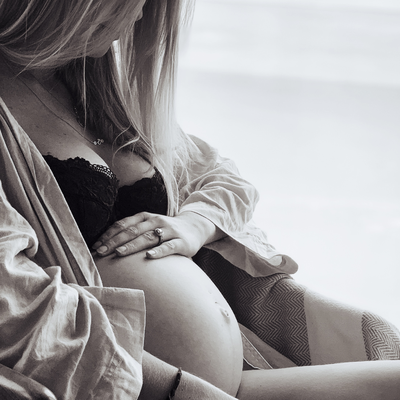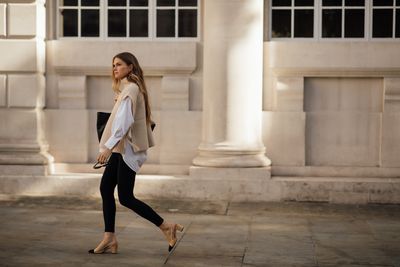

My Journey Into Motherhood: Ellie Woodhouse-Clarke
All products on this page have been selected by our editorial team, however we may make commission on some products.
I was told I was infertile at 24. I had never started my periods naturally, so had been put on the pill to ‘create’ a cycle at age 17. When I came off it seven years later, I noticed my hair was falling out, I was exhausted and sex was painful. Ten months later, as well as these and other symptoms, I noticed I still didn’t have a period. I was determined to understand what was going on with my body, and after speaking to several specialists over the course of a year, I was eventually diagnosed with primary amenorrhoea and hypothalamic hypogonadism – the result of a genetic condition that is mainly carried on the male side of my family.
Several chronic health problems affected my endocrine, digestive, immune and nervous systems. Within the space of three months, I was told I was infertile, that I had a pituitary tumour and an autoimmune condition called lupus. Fortunately, the tumour and the lupus were deemed ‘incidental findings’ and not related to my infertility. But it was a very frightening time, particularly at such a young age, and it really tested my mental strength.
To improve my health, I started exploring nutrition, holistic practices and intuitive living. It’s these personal explorations that have led me to where I am today. In 2014, I trained as a yoga teacher and shortly afterwards, I enrolled on a three-year course at the College of Naturopathic Medicine to study naturopathic nutritional therapy. My studies gave me an in-depth understanding of the body - its anatomy, biochemistry, physiology, states of disease and the interplay between nutrition and stress at a cellular level.
My husband Mat and I met ten years ago. We were married in 2019, and decided shortly after that to start trying to conceive. It felt early, but seeing as we’d previously been told that IVF may not work for us, we were keen to get going as we both knew we’d love to have children but that it could take some time. We went through two unsuccessful rounds of IUI on the NHS, before moving to a low-cost clinic to start IVF. Then, Covid came, the clinics shut and – luckily – we were one of the last couples to be accepted and treated. Our treatment started on the first day of the first lockdown.
The first few days of injections were a little daunting. It was a bit confusing (measuring the liquids, flicking bubbles, attaching the needles etc.), but the process became second nature very quickly. In fact, I found the injections really empowering. After all the consultations and the heartbreak that had come before, I was finally able to be proactive in my own health. I didn't find them particularly painful (nothing a deep breath couldn't mitigate) and I actually used them as a moment to be really present.


Ten eggs were collected during our first round of IVF. Two were then successfully fertilised, but only one made it to a healthy ‘day three’ embryo. We were advised to freeze it due to the unknowns around Covid, but we decided to go ahead with the process, even if it meant having to be extra careful with shielding for the entire pregnancy. Everyone was in lockdown at the start, but we continued to socially distance throughout the entire nine months – I didn’t hug a single friend and we didn’t even see our family to tell them about the pregnancy in the usual way. Having spent four years not knowing whether we’d ever be able to get pregnant, it was really hard not to be able to enjoy the special time with our close friends and family.
Due to my history, I found it difficult to trust my pregnant body. The IVF nurses had also warned me to avoid a lot of things (like having baths, hot showers, certain foods and exercising), which contributed to my feeling that something could make me miscarry. I was very anxious for the first half of my pregnancy and in the end, I sought out counselling to address my fears, process some of what I’d been through in the years leading up to the pregnancy, and to help me learn to trust my body.
I planned a non-medicated home birth with my first son. I have a bit of an irrational phobia of the side effects of drugs, so I preferred the idea of using hypnobirthing tools and breathwork to manage the pain. Two weeks before I went into labour we’d moved from London to Somerset. The first thing we did was make sure our birthing space was set up and felt safe and calm. We had a birthing pool, candles, our favourite music and affirmations posted around the room. My labour lasted eight hours and I had my eyes closed for pretty much the entire thing! Mat was an amazing support – as were the two midwives and our dog Elmo. To give birth without any pain relief was the most empowering experience, and our first son Bowie arrived safely one week before Christmas.

We decided to begin our second round of IVF when Bowie was 10 months old. Just like the first time, we didn’t know how long it would take, but we knew we’d love to have our children be close in age if possible. Bowie’s embryo was the only healthy embryo with our first round, meaning we didn’t have any frozen embryos to transfer and we had to start again from scratch. I was told by the clinic that I had to stop breastfeeding before beginning the process, which was upsetting as I’d have loved to carry on for a while longer. We were very lucky that this round of IVF also worked first time, and our second son River was born at the end of October 2022. We also now have three healthy embryos frozen if we want to try again.
I was far less anxious in my second pregnancy. I suppose I knew my body was capable of carrying a baby to full term. Towards the end, I did find feel upset knowing I wouldn’t be able to give Bowie my undivided attention with a new baby around, but I was reassured by friends that this was a very normal emotion to experience before having a second child. I was also suffering with pelvic girdle pain (which started at 12 weeks), so I wasn’t able to be as active with Bowie as I’d have liked. Fortunately, the pain went away as soon as I gave birth.
You can’t control what will happen during your birth. But you can try to create an environment that will make a difference to how you experience it. The local birthing centre had been shut for a year and was due to reopen in November 2022. Our second son, River, arrived early and was born in hospital – just 24 hours before the planned reopening of the birthing centre. Although it wasn’t the exact birth we’d planned, Mat and I did everything we could do make the hospital environment feel safe and I managed to have another non-medicated birth.
Breastfeeding came naturally to me both times and I’m grateful to have had positive experiences with breastfeeding. I know some people get worried about feeding in public, but I’ve only ever had supportive interactions from strangers. It still amazes me that my body can produce something for free that’s so deeply nourishing for my children.


My parenting strategy is to go with the flow. I’m currently breastfeeding River on demand and the boys co-sleep with us, too. Bowie’s always been happy to nap in the buggy, which has given us a lot of freedom to go where we want, when we want, and it’s the same with River. One thing that I’ve found really triggering, however, is how often people use the phrase ‘the terrible twos’. I see Bowie arriving at an age where he’s learning very quickly and experiencing lots of new emotions. Yes, we’re noticing more tears than before, but rather than dismissing them, I really try to hold him in those moments. I feel that one of my biggest responsibilities as a parent is to help our boys understand their emotions and give them the means to express themselves.
The transition from one to two children has felt very different. We feel like a proper family unit now, but it’s a constant juggling act. When River was five days old, he had a high temperature and had to go to hospital. Thankfully he was fine, but during that time I spent three days and nights away from Bowie, which was the longest I’d ever been away from him. I found that really tough as I wanted to be there with him – he is still so little and had to adjust to life without his little brother around. It’s challenging not being able to be there for them both of them all of the time, but it's something I’m slowly getting used to.
When River was eight weeks old, I felt pretty overwhelmed. Mat and I decided last minute to escape home for a week over new year, to spend time just the four of us – disconnected from everything else. We’ve learnt that when the world feels overwhelming, we have to make our world as small as possible and focus on what is most important to us – our beautiful boys.
One thing about motherhood that has stuck with me is to prioritise your partner as well. It’s easy to prioritise your children at the expense of neglecting each other. But checking in and being kind to one another, even in the hard times, makes parenting – and life in general – much more enjoyable.
Follow @EllieMaeClarke
DISCLAIMER: We endeavour to always credit the correct original source of every image we use. If you think a credit may be incorrect, please contact us at info@sheerluxe.com.


